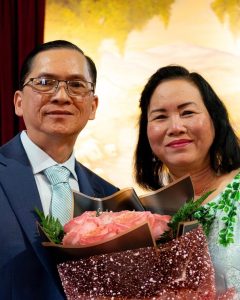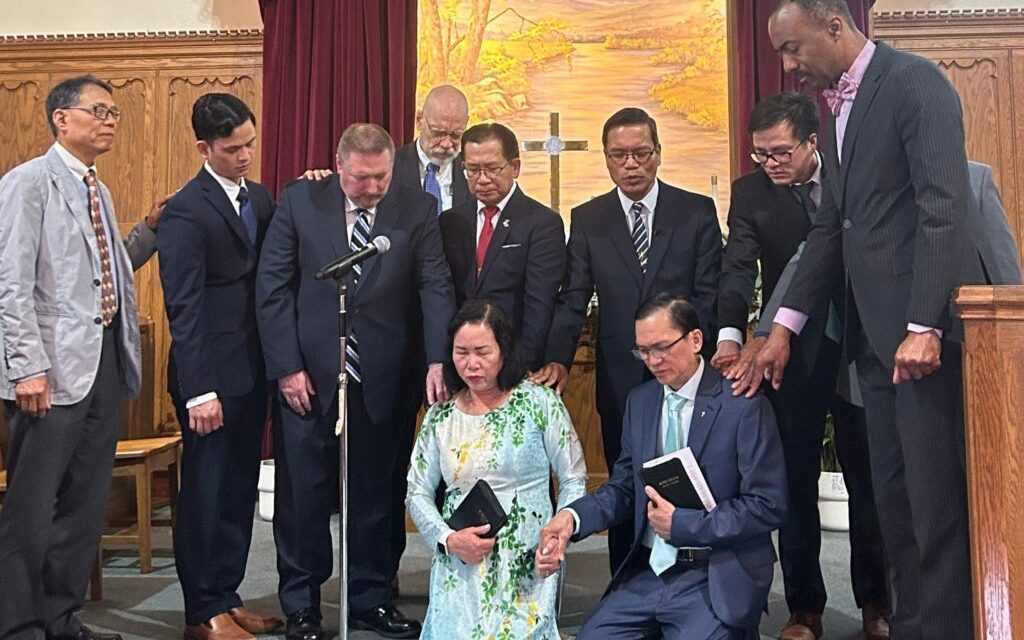QUINCY, Mass. (BP) – Growing up during the final decade of the Vietnam War, Hồng Đức Phạm never dreamed that one day he would leave Vietnam, relocate to the United States and become a Baptist minister.
Born in 1967 in Kế Sách village, Sóc Trăng, in southern Vietnam, Phạm grew up in a Christian family. His parents had embraced Christianity in 1956 and, as a child, he accompanied them to church. When he was 13, the faith became his own.
“My life took a transformative turn,” he said in written comments. “One evening after a Bible study with my church community, I prayed and experienced a profound spiritual awakening. The Holy Spirit touched my life, instilling in me a deep love for studying the Bible and following God’s Word.”

Hồng Đức Phạm married Nguyet Nguyen in 1987. Both grew up in Christian homes in Vietnam. They immigrated to Boston in 2015. Image provided.
Phạm was a farmer and active church member in rural Vietnam when he received an offer to train for the ministry about 20 years ago. He moved to the city, switched careers to photography and began taking classes five days a month at the Vietnamese Theological School.
In 2009, he graduated from UUC with a bachelor’s in theology and continued involvement in local church work.
In 2015, Phạm and his family immigrated to Boston. The next year, he began leading a handful of other Vietnamese families in Bible study and worship every Sunday. That effort grew into what is now Vietnamese Baptist Church of Quincy, which counts 49 members.
Last month, the church officially ordained Phạm as pastor and officially became the first Vietnamese church to affiliate with the Baptist Convention of New England.
“What I have loved since God called me in His grace when I was still in Vietnam is to testify about the Gospel to people who do not know God,” Phạm said. “I also love to preach God’s Word in the Bible to believers in the church and to build the faith of God’s flock to be strong.”
Phạm preaches in Vietnamese. He is not yet able to preach in English, the language most used by younger Vietnamese, including his daughters, who were born in Vietnam but now live in the U.S.
The average age of the members of the Vietnamese Baptist Church of Quincy is over 50, which is a problem for a church that wants to reach second-generation Vietnamese in Greater Boston.
At least 53,700 Vietnamese live in Massachusetts. How does a church that lacks an English-speaking pastor present the Gospel to its second generation, those born in the United States, and to the so-called 1.5 generation, those who arrived here as children or teens?
“Our challenge now in New England,” wrote Lierte Soares Jr., the BCNE president in an online article published earlier this year, “will be to make churches work together in a missiology and ecclesiology that cultures will be confronted with the biblical truth of inclusion and contextualization. Both ethnic churches and Anglo churches need to evaluate their practices and begin a process of mutual cooperation so that third-culture children [and adults] can be God’s answer to the revitalization of our churches here in New England.” “Third culture kids” refers to those who move between cultures before they have a fully formed cultural identity.
Phạm reports that, for the 1.5 generation, the challenge is that they choose other Vietnamese or American churches with more young people, while children attend church with their grandparents.
“Last year, our church lacked young people participating in worshiping God,” he said. “We have not been able to reach out to migrants and Vietnamese students because the church lacks young Christians. We hope and pray to God for this work so that the church can have more new and young people join.”
BCNE leaders join Phạm in that prayer.
“We are thankful for Pastor Hồng Đức Phạm’s deep commitment to preaching the Word of God and sharing the Gospel with others,” said BCNE Executive Director Terry Dorsett. “He is an inspiration to all of us in the BCNE. We are excited about partnering with this church to reach the Vietnamese community in the Boston area. We understand the challenges of reaching the second generation and look forward to helping his congregation tackle this challenge.”
This article was originally published to the Baptist Press. Feature image provided.





